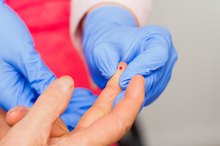Can Low Blood Sugar Make You Lose Weight?
Hypoglycemia, or low blood sugar, most commonly occurs among diabetics, people taking certain medications or those with deficiencies of specific hormones and enzymes. But among people who are desperately trying to lose weight, not eating enough food or exercising too much can cause extremely low blood sugar levels. And although these people might believe that low blood sugar is helping them lose weight, it’s actually doing more harm than good.
Hypoglycemia
The body enters a state of hypoglycemia when blood sugar levels drop below normal. Often referred to as “low blood sugar” or “low blood glucose,” the condition generally occurs once blood glucose levels drop below 70 mg/dL. Carbohydrates, including rice, grains, potatoes, wheat, fruit, milk and sugar, are the body’s main sources of glucose. Once glucose enters the bloodstream, it is transported to the body’s cells where it is used as a source of energy. Excess glucose is stored as either glycogen or fat, both of which can be used as alternative energy sources when necessary.
Since carbohydrates are your body's main source of glucose, eating too little food or not eating often enough can easily result in low blood sugar. Additionally, vigorous exercise increases the amount of insulin produced in your body, which breaks down blood sugar. As a result, too much insulin production often results in low blood sugar levels.
- The body enters a state of hypoglycemia when blood sugar levels drop below normal.
- Often referred to as “low blood sugar” or “low blood glucose,” the condition generally occurs once blood glucose levels drop below 70 mg/dL.
- Carbohydrates, including rice, grains, potatoes, wheat, fruit, milk and sugar, are the body’s main sources of glucose.
Blood Sugar and Weight Loss
What Happens to Sugar Levels in the Blood While Fasting?
Learn More
Since excess glucose is stored as fat, some people assume that keeping blood sugar levels low will result in the breakdown of fat when energy is needed. However, if your blood sugar levels remain too low for too long, your body begins to think that starvation is imminent. In response, it goes into survival mode. As part of survival mode, your body stops burning fat and instead protects these important fat cells. At this point, all weight that is lost comes from muscle and your body’s water supply. Although the weight will probably be dropping pretty quickly, it’s an extremely unhealthy form of weight loss that could result in permanent damage to the body. Although it might seem as though your low blood sugar level is helping you lose the weight, it’s actually harming your body.
- Since excess glucose is stored as fat, some people assume that keeping blood sugar levels low will result in the breakdown of fat when energy is needed.
- Although it might seem as though your low blood sugar level is helping you lose the weight, it’s actually harming your body.
Symptoms
Early symptoms of hypoglycemia are distracting, although not necessarily dangerous. These early signs might include intense hunger, shakiness, dizziness, sudden sweating and a feeling of nervousness. If your blood glucose levels remain low, symptoms progress to include confusion, anxiety, difficulty speaking, weakness and clumsiness. Severe hypoglycemia that goes untreated could lead to seizures, coma and death.
- Early symptoms of hypoglycemia are distracting, although not necessarily dangerous.
Considerations
How to Lose Weight With Hypoglycemia
Learn More
Although low blood sugar can be extremely dangerous, high blood sugar is just as risky. The condition of hyperglycemia, or high blood sugar, occurs when the body cannot produce enough insulin to process its carbohydrate levels. If you allow blood sugar levels to remain elevated for too long, a condition known as ketoacidosis could occur. When this happens, the body begins breaking down fat to use as fuel. When fat is broken down, ketone waste products are produced. If too many ketones accumulate in the bloodstream, it could result in coma or death.
- Although low blood sugar can be extremely dangerous, high blood sugar is just as risky.
- If you allow blood sugar levels to remain elevated for too long, a condition known as ketoacidosis could occur.
Safety Recommendations
To ensure your safety while losing weight, speak with your doctor about your body’s safe blood sugar levels. For people without diabetes, blood sugar levels should remain at 70 to 99 mg/dL while fasting or 70 to 140 mg/dL after meals. For people with diabetes, blood sugar levels should remain at 70 to 140 mg/dL while fasting and 70 to 180 mg/dL after meals.
Related Articles
References
- MayoClinic.com; Glycemic Index Diet: Losing Weight With Blood Sugar Control; Nov. 24, 2009
- Calories Per Hour: How Blood Sugar Levels Affect Weight Loss
- American Diabetes Association. 5. Lifestyle management: Standards of medical care in diabetes-2019. Diabetes Care. 2019;42(Suppl 1):S46-60. doi:10.2337/dc19-S005
- National Institute of Diabetes and Digestive and Kidney Diseases. Diabetes diet, eating, & physical activity. Published December 2016.
- American Diabetes Association. The big picture: Checking your blood glucose.
- American Diabetes Association. 6. Glycemic Targets: Standards of Medical Care in Diabetes-2020. Diabetes Care. 2020;43(Suppl 1):S66-S76. doi:10.2337/dc20-S006
- American Diabetes Association. 14. Management of diabetes in pregnancy: Standards of medical care in diabetes-2020. Diabetes Care. 2020;43(Suppl 1):S183-S192. doi:10.2337/dc20-S014
- Porcellati F, Lucidi P, Bolli GB, Fanelli CG. Thirty years of research on the dawn phenomenon: Lessons to optimize blood glucose control in diabetes. Diabetes Care. 2013;36(12):3860-2. doi:10.2337/dc13-2088
- American Diabetes Association. 5. Lifestyle management: Standards of medical care in diabetes-2019. Diabetes Care. 2019;42(Suppl 1):S46-60. doi:10.2337/dc19-S005
- Colberg SR, Sigal RJ, Yardley JE, et al. Physical activity/exercise and diabetes: A position statement of the American diabetes association. Diabetes Care. 2016;39(11):2065-2079. doi:10.2337/dc16-1728
- American Diabetes Association (ADA). Understanding A1C.
- Garber AJ, Abrahamson MJ, Barzilay JI, et al. Consensus statement by the American association of clinical endocrinologists and American college of endocrinology on the comprehensive type 2 diabetes management algorithm - 2019 executive summary. Endocr Pract. 2019;25(1):69-100. doi:10.4158/CS-2018-0535
Writer Bio
Krista Sheehan is a registered nurse and professional writer. She works in a neonatal intensive care unit (NICU) and her previous nursing experience includes geriatrics, pulmonary disorders and home health care. Her professional writing works focus mainly on the subjects of physical health, fitness, nutrition and positive lifestyle changes.









